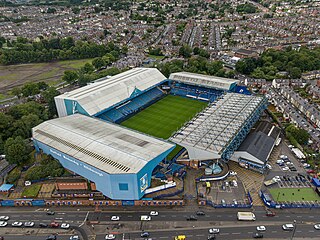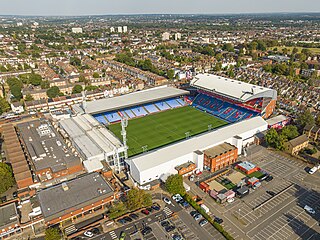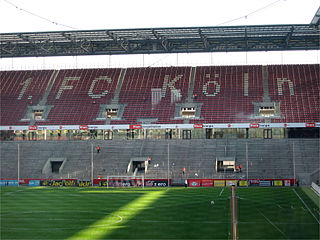
Liverpool Football Club is a professional football club based in Liverpool, England. The club competes in the Premier League, the top tier of English football. Founded in 1892, the club joined the Football League the following year and has played its home games at Anfield since its formation.

The Hillsborough disaster was a fatal human crush at a football match at Hillsborough Stadium in Sheffield, South Yorkshire, England, on 15 April 1989. It occurred during an FA Cup semi-final between Liverpool and Nottingham Forest in the two standing-only central pens in the Leppings Lane stand allocated to Liverpool supporters. Shortly before kick-off, in an attempt to ease overcrowding outside the entrance turnstiles, the police match commander, David Duckenfield, ordered exit gate C to be opened, leading to an influx of supporters entering the pens. This resulted in overcrowding of those pens and the crush. With 97 deaths and 766 injuries, it has the highest death toll in British sporting history. Ninety-four people died on the day; another person died in hospital days later, and another victim died in 1993. In July 2021, a coroner ruled that Andrew Devine, who died 32 years later, after suffering severe and irreversible brain damage on the day, was the 97th victim. The match was abandoned and restaged at Old Trafford in Manchester on 7 May 1989; Liverpool won and went on to win that season's FA Cup.

Hillsborough Stadium is a football stadium in Sheffield, England. It has been the home of Sheffield Wednesday since opening in 1899.

Sheffield Wednesday Football Club is a professional association football club based in Sheffield, South Yorkshire, England, that compete in the EFL Championship, the second tier of English football. Formed in 1867 as an offshoot of The Wednesday Cricket Club, they were known as The Wednesday Football Club until 1929.

A stadium is a place or venue for (mostly) outdoor sports, concerts, or other events and consists of a field or stage either partly or completely surrounded by a tiered structure designed to allow spectators to stand or sit and view the event.
The Hillsborough Stadium Disaster Inquiry report is the report of an inquiry which was overseen by Lord Justice Taylor, into the causes of the Hillsborough disaster in Sheffield, South Yorkshire, England, on 15 April 1989, as a result of which, at the time of the report, 95 Liverpool F.C. fans had died. An interim report was published in August 1989, and the final report was published in January 1990.

Selhurst Park is a football stadium in Selhurst, in the London Borough of Croydon, England, which is the home ground of Premier League side Crystal Palace. The stadium was designed by Archibald Leitch and opened in 1924. It has hosted international football, as well as games for the 1948 Summer Olympics; it was shared by Charlton Athletic from 1985 to 1991 and Wimbledon from 1991 to 2003.

The Bradford City stadium fire occurred during a Football League Third Division match on Saturday, 11 May 1985 at the Valley Parade stadium in Bradford, West Yorkshire, England, killing 56 spectators and injuring at least 265. The stadium was known for its antiquated design and facilities, which included the wooden roof of the main stand. Previous warnings had also been given about a major build-up of litter in the cavity below the seats in the stand. The stand had been officially condemned and was due to be replaced with a steel structure after the season ended.

Adams Park is an association football stadium in High Wycombe, Buckinghamshire, England. Built in 1990, it is the home ground of the local Wycombe Wanderers in League One. It was also leased from 2002 to 2014 to the rugby union club London Wasps from Aviva Premiership, and from 2016 to 2020 to the Reading F.C. Women football club. From the 2003/04 season to the 2005/06 season, the stadium was officially called Causeway Stadium, named after its sponsor Causeway Technologies.
Simon Inglis is an author, editor, architectural historian and lecturer. He specialises in the history, heritage and architecture of sport and recreation. Inglis is best known for his work on football history and stadiums, and as editor of the Played in Britain series for English Heritage.

An all-seater stadium is a sports stadium in which every spectator has a seat. This is commonplace in professional association football stadiums in nations such as the United Kingdom, Spain, and the Netherlands. Most association football and American football stadiums in the United States and Canadian Football League stadiums in Canada are all-seaters, as are most baseball and track and field stadiums in those countries. A stadium that is not an all-seater has areas for attendees holding standing-room only tickets to stand and view the proceedings. Such standing areas are known as terraces in Britain. Stands with only terraces used to dominate the football attendance in the UK. For instance, the South Bank Stand behind the southern goal at Molineux Stadium, home of Wolverhampton Wanderers, had a maximum of 32,000 standing attenders, while the rest of the stadium hosted a little bit less than that; the total maximum attendance was around 59,000.
The Football Supporters' Federation (FSF) was an organisation representing football fans in England and Wales. It campaigned across a range of issues and supports fan representation on clubs' boards, lower ticket prices, and the introduction of safe standing areas at grounds in the top two tiers of English football. The organisation was free to join and acted as a singular voice for football fans.
A building control body is an organisation authorised to control building work that is subject to the Building Regulations in England and Wales (similar systems are provided in Northern Ireland, and in Scotland where the term 'building standards' is used. Such regulations or standards are also known as building codes in other parts of the world.

A terrace or terracing in sporting terms refers to the standing area of a sports stadium, particularly in the United Kingdom and Republic of Ireland. It is a series of concrete steps, with intermittent safety barriers installed at specific locations to prevent an excessive movement of people down its slope.

The Burnden Park disaster was a human crush that occurred on 9 March 1946 at Burnden Park football stadium, then the home of Bolton Wanderers. The crush resulted in the deaths of 33 people and injuries to hundreds of Bolton fans. It was the deadliest stadium-related disaster in British history until the Ibrox Park disaster in 1971.
Sir Oliver Bury Popplewell is a British former judge and cricket player. He chaired the inquiry into the Bradford City stadium fire, presided over the libel case brought by Jonathan Aitken MP against The Guardian newspaper which eventually led to Aitken's imprisonment for perjury, and was widely reported for asking "What is Linford's lunchbox?" during a case over which he was presiding, brought by Linford Christie. He played first-class cricket for Cambridge University and was president of the Marylebone Cricket Club from 1994–96. He wrote a book about his legal career.

The Guide to Safety at Sports Grounds, colloquially known as the Green Guide is a UK Government-funded guidance book on spectator safety at sports grounds. The Guide provides detailed guidance to ground management, technical specialists such as architects and engineers and all relevant authorities to assist them assess how many spectators can be safely accommodated within a sports ground.

The 1971 Ibrox disaster was a crush among the crowd at an Old Firm football game, which led to 66 deaths and more than 200 injuries. It happened on 2 January 1971 in an exit stairway at Ibrox Park in Glasgow, Scotland. It was the worst British football disaster until the Bradford City stadium fire in Bradford, England, in 1985. This was followed by 97 deaths in the Hillsborough disaster in Sheffield, England, in 1989.

Safe standing is a measure of design in stadia to ensure that spectators are able to stand safely during events. It is important in the context of association football in the United Kingdom, where a series of fatal incidents led to legislation requiring major clubs to develop all-seater stadiums during the 1990s. Since then, fan groups have campaigned against the ban on standing accommodation, arguing that new design options would allow designated standing areas to be built in compliance with all safety laws and guidelines. As these options are outlawed in England and Wales, safe standing in practice originated in continental Europe, primarily Germany. This occurred because although UEFA and FIFA required all-seater stadiums for international competition, it was not mandatory for domestic matches.

Samuel Thorburn, CBE, FREng, FIStructE, FICE, is a British civil engineer. He was president of the Institution of Structural Engineers (IStructE) in 1997-1998 and the 2003 recipient of their Gold Medal. He served as Chairman of the Scottish Building Standards Advisory Committee.















